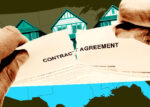Whether the U.S. is already in a recession remains up for debate, but one thing real estate economists agree on is that the housing market is in for a rough stretch.
After a “respectable” start to the year, the third and fourth quarter home sales figures will be “ugly,” predicted Lawrence Yun, the National Association of Realtors’ chief economist, at the National Association of Real Estate Editors’ annual conference in Atlanta.
Signed contracts will continue to fall, Yun said, and home sales could be down 15 percent by the end of the year. But unlike the run-up to the 2008 crash, when the housing market was awash in unsold inventory, the supply of available homes this time around remains extremely low, and Yun’s co-panelists said millennials will drive continued demand in the coming years.
Read more



Average home prices soared 37 percent during the pandemic, prompting Federal Reserve chairman Jerome Powell to call for a housing market “reset” in June. Price growth has slowed since the Fed began raising interest rates in the spring, and housing economists expect that to continue.
Month-to-month home price growth took a “rapid turn” in the second quarter when mortgage rates surged, said Selma Hepp, deputy chief economist at CoreLogic. Prices in a quarter of markets are already down from peaks seen earlier this year, she said, noting that second-home markets face the greatest risk of declines.
South Florida is an outlier, as prices in the region have continued to rise even as other markets normalize, according to CoreLogic data.
Yun’s assertion that the country is already in a recession sparked some dissent among his co-panelists.
“Just look at your 401k account,” he said.
Danielle Hale, chief economist at Realtor.com, said job numbers will help determine when, not if, the economy is officially in a recession.
“Unemployment is 3.5 percent. That’s well below what we expect is the typical rate of unemployment” in a recession, she said.
Lisa Sturtevant, chief economist with Bright MLS, preferred to label it a “housing resetting” as sellers consider adjusting their prices. Homeowners who have placed their properties on the market are “going through the five stages of grief,” she said.
The idea of mortgage rates rising to 7 percent is “scary” for buyers, she said.
“We talk about home buying as a financial or economic decision, but it is really an emotional one.”
Though numerous mortgage lenders and residential brokerages have already begun laying off employees in preparation of a market downturn, most real estate agents are independent contractors.
In 2006, at the last peak, there were 1.4 million realtors, Yun said. Today, there are a record 1.6 million.
“There will be a shakeout but it will be determined by the realtors themselves,” he said. “The extent to which people are attached to the real estate industry will change.”
